News Article
Preview: The Ballad of Maria Marten
23 Apr 25
Director Cal Beckett introduces this re-telling of the story of an infamous 1827 murder in Suffolk, which though it caught the public’s attention at the time and has been a source of curiosity ever since, ignored the victim’s narrative.
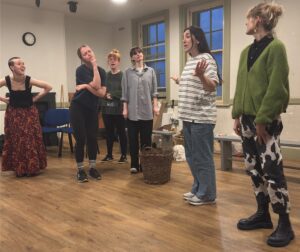
What attracted you to directing this play?
I’d never seen the play before, or heard of it. I was browsing in the National Theatre bookshop – I’d wanted to challenge myself by finding a play to direct that I’d never seen or read. I came across it on the shelf, skimmed through a few pages and liked what I saw, so bought it and took it home. I then couldn’t put it down – apart from the fact that it was an intriguing true narrative with an important message underlying it, I loved the way it was written, with pacey scenes and dialogue that was very real, often touching and at times very funny and bawdy.
It had characters I could visualise easily, and an ending that I found very affecting. From a staging perspective it also looked do-able, though as time has gone on it’s increased in complexity! For the first time as a director I’ve included live music to help tell the story – thanks to Owen Chidlaw and Alan Walker for their invaluable support with this.
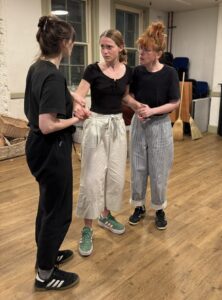
The play is based on a true story - why does this story need to be told?
The Murder in the Red Barn, as Maria Marten’s story came to be known, spawned a number of melodramatic stage plays, including one at SLT in 1971. The crime may have occurred 200 years ago, but still at least two women a week in the UK are killed by their partners, and thousands more are subjected to coercive control and domestic violence. The story of the murder became what passed for tabloid fodder back then, with huge public interest created by the gruesome discovery of Maria’s body, the subsequent manhunt for her murderer and his execution once found guilty.
But little is known about Maria and her life up until her murder – and how often is this still the case? (I’m reminded of the play Maryland performed at SLT in 2021, directed by Charlotte Benstead, and written by Lucy Kirkwood in response to a distressing series of femicides.) Even the one existing sketch likeness of Maria in records from the time was actually of her sister and not her. Author Beth Flintoff was commissioned to write a play that redressed the balance and focused on the narrative of Maria and her friends, and so the story is told from their perspective – Maria “breaks the fourth wall” and speaks directly to the audience throughout the play. The story also highlights the tough, minimal economic choices faced by young, uneducated working class women in rural communities at that time, as well as the importance of female friendships and support.![]()
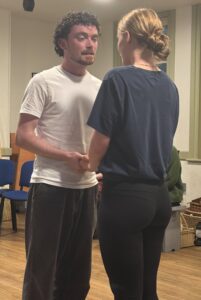
How have you immersed yourself in the history of Maria Marten and has this affected how the play is directed?
Beth Flintoff points to a detailed account of the Red Barn murder, and particularly William Calder’s trial, by historian Peter Maggs. But internet searches I made unearthed a number of conflicting accounts from various sources, and there’s little doubt that the writer has exercised an amount of artistic licence. I even read a ‘Josephine Tey’ novel The Death of Lucy Kyte by Nicola Upson, set in Polstead and with the aftermath of the murder as the focus of a detective mystery.
The cast, crew and I recently visited Moyses Hall Museum in Bury St Edmunds, where a number of artefacts connected with the murder and trial are stored, including Calder’s pistols and two books about the trial bound in his skin, flayed and tanned by the surgeon who dissected his body. Curator Dan Clarke confirmed the conflicting stories. We also visited the village of Polstead deep in the Suffolk countryside where Maria lived and died; we saw her house, the pond and church referenced in the play and the local inn where the inquest into her death was held.
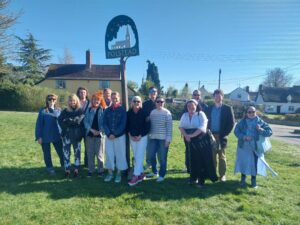
In telling a true story about real people, the cast and I have been keen to aim for authenticity and to try and piece together the back stories of the characters. It probably hasn’t affected the way I direct, but it does mean that telling the story as truthfully as we can has been important to us. Interestingly (spoiler alert!), the murderer William Corder never appears in the play, another way in which the author has rebalanced the narrative.
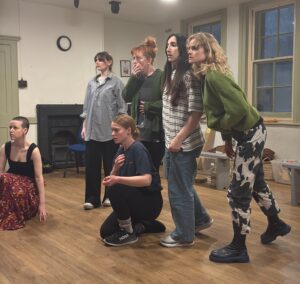
Have you faced any unexpected challenges when directing this play?
My lovely cast have been so committed and diligent in learning lines, inputting ideas and working together, and the crew’s been similarly enthusiastic – so it’s been a bit of a joy.
However, my vision for the set design and seating layout has presented Stephen Hayward with a challenge, and I had thought that it would be a fairly minimal show from the perspective of props – my stage manager Aurora Mclaughlin-Gouldhacker will testify that I was very much mistaken! Lorraine Spenceley has also done an amazing job with the huge range of 19th century costumes and accessories we’ve needed to put together. As I write we still have our get-in to come, and we’ll have the challenge of building the barn which will form part of the staging, and my AD James Jackson will be plotting some atmospheric lighting.
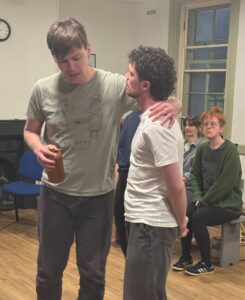
Tell us about the characters we will meet.
The lead role of Maria (Flora Blissett) is a challenging one – she acts out her story and frequently breaks the fourth wall to speak to the audience. Her stepmother Ann (Hannah McCorry) was a key player in the real story – she dreamt that Maria was buried in the barn and this led to the discovery of the body. We also meet her closest friends (known as the Hazard Club) – the Stowe cousins Sarah (Marissa Ferrara) and Phoebe (Suki Rees), Lucy Balaam (Charlotte Robathan) and Theresa Havers (Amy Perkis, who also sings in the show, accompanied by musician Owen Chidlaw).
Thomas Corder (Joe Dominic), the elder brother of Maria’s murderer William, also appears as Maria’s first lover, and Peter Mathews (Jack Matthews) becomes Maria’s true amour, but their affair is doomed by the inequality of their status, as laid down in no uncertain terms by his until then apparently enlightened sister, Lady Cooke of Polstead Hall (Hannah Noyce).
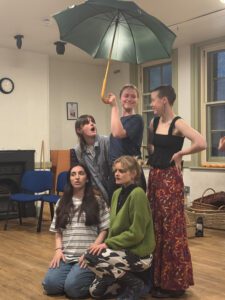
Describe the show in three words.
Enduring. Heartfelt. Empowering.
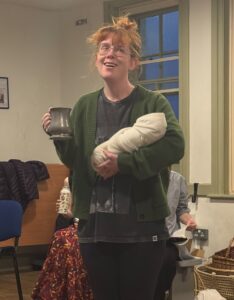
The Ballad of Maria Marten plays at SLT Fire Station 8pm 6 – 10 May. Buy tickets here